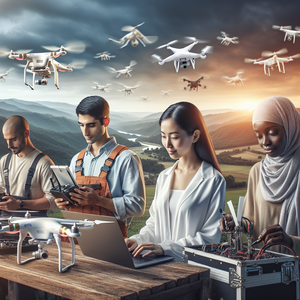The AI Co-Pilot Revolution: Transforming the Drone Industry in 2025

AI-driven technologies have unlocked new levels of autonomy and functionality in drones, enabling them to undertake complex tasks with minimal human intervention. While drones have always been valued for their ability to access hard-to-reach areas, the integration of AI has significantly enhanced their capabilities. Today, AI co-pilots leverage advanced algorithms in computer vision, machine learning, and real-time decision-making to perform tasks that were once impossible or required extensive human oversight.
Applications Across Industries
The impact of AI in the drone industry is particularly evident in sectors like agriculture, infrastructure inspection, and disaster response: 1. **Agriculture**: AI-powered drones are revolutionizing farming by analyzing crop health through multispectral imaging. Farmers can now identify areas of concern, such as pest infestations or nutrient deficiencies, with precision. Some drones go a step further, autonomously deploying fertilizers or pesticides exactly where they are needed, reducing waste and enhancing productivity. 2. **Infrastructure Inspection**: In industries like construction and energy, drones equipped with AI image recognition software can inspect structures such as bridges, wind turbines, and pipelines. These drones detect defects like cracks and corrosion with remarkable accuracy, significantly reducing inspection time and costs. 3. **Disaster Response**: AI-driven drones are proving invaluable in disaster zones. They can autonomously map affected areas, locate survivors, and deliver critical supplies. For example, during a wildfire, drones can analyze real-time data to identify the fire's spread and recommend ways to contain it, all while operating in environments too dangerous for human responders.
Redefining the Role of Human Pilots
As AI co-pilots take on more responsibilities, the role of human operators is evolving. In the early days of drone technology, piloting primarily involved manual flight control. Today, the focus has shifted toward overseeing autonomous systems and making strategic decisions based on the data collected by drones.
From Manual Operation to Strategic Oversight
AI co-pilots now handle routine functions like takeoffs, landings, obstacle avoidance, and waypoint navigation. This shift allows human operators to concentrate on mission planning and data analysis—higher-level tasks that require human judgment and expertise. For instance, a drone operator inspecting wind turbines no longer needs to manually pilot the drone around each turbine. Instead, they monitor the AI system, interpret the collected data, and ensure compliance with safety and regulatory standards.
The New Skill Set for Drone Operators
In 2025, drone operators must possess a more advanced and diverse skill set to remain competitive. Key areas of expertise include: - **AI System Monitoring**: Understanding how AI algorithms work and ensuring they function correctly during operations. - **Data Analysis**: Interpreting data gathered by drones to generate actionable insights. - **Troubleshooting**: Diagnosing and resolving technical issues in AI-powered systems. - **Regulatory Compliance**: Navigating evolving rules, such as those governing beyond-visual-line-of-sight (BVLOS) operations. Upskilling in these areas will help drone operators adapt to their evolving roles and thrive in an industry increasingly dominated by AI.
Opportunities and Challenges for Drone Operators
The integration of AI into the drone industry offers both exciting opportunities and notable challenges for professionals. #### Opportunities 1. **Increased Productivity**: With AI taking over time-consuming tasks, drone operators can handle more projects simultaneously, boosting their productivity and earning potential. 2. **New Career Paths**: The demand for professionals skilled in AI technologies and drone operations is growing. Emerging roles include AI system integration specialists, drone fleet managers, and data analysts. 3. **Improved Safety**: By automating high-risk tasks, AI-powered drones reduce the likelihood of accidents, protecting both operators and equipment. #### Challenges 1. **Job Displacement**: As autonomous systems become more capable, traditional piloting roles may become redundant. Operators who fail to upskill risk being left behind. 2. **Continuous Learning**: The rapid pace of technological advancement requires operators to commit to lifelong learning. Certifications in AI, programming, and data analysis are increasingly necessary. 3. **Ethical and Regulatory Issues**: The use of AI in drones raises concerns about privacy, security, and misuse. Operators must stay informed about evolving regulations and societal expectations to ensure responsible use of the technology.
Case Study: AI in Action
One of the most compelling examples of AI co-pilots in action comes from the infrastructure inspection sector. In 2025, a leading drone company deployed AI-powered drones to inspect a network of bridges across the United States. These drones used advanced image recognition software to identify structural issues such as cracks, rust, and misaligned components. Although the drones operated autonomously, human pilots played a crucial role in overseeing the missions, ensuring safety protocols were followed, and verifying the AI's findings. The results were remarkable: inspection times were cut by 50%, costs were significantly reduced, and the accuracy of defect detection improved by 30%. This case study underscores the potential of AI-human collaboration, showcasing how the strengths of both can be combined to achieve better outcomes.
The AI co-pilot revolution is reshaping the drone industry in 2025, bringing unprecedented levels of autonomy and efficiency to drone operations. While this transformation presents challenges, such as the potential obsolescence of traditional piloting roles, it also creates exciting opportunities for those willing to adapt and evolve. Drone operators who embrace new technologies, acquire specialized skills, and learn to work seamlessly alongside AI systems will find themselves at the forefront of this dynamic industry. As drones become smarter and more capable, the collaboration between human expertise and AI innovation will continue to shape the future of the industry. For those who navigate this shift effectively, the sky is truly the limit.
AI Drone Systems Engineer
Drone manufacturers (e.g., DJI, Skydio), aerospace companies, or startups focused on drone technology
Core Responsibilities
Design and develop AI algorithms for autonomous drone navigation, obstacle avoidance, and data processing.
Collaborate with hardware teams to optimize drone performance and integrate AI systems with sensors like LiDAR and cameras.
Test and refine AI models in real-world drone operations to ensure reliability under various environmental conditions.
Required Skills
Expertise in machine learning frameworks (e.g., TensorFlow, PyTorch) and computer vision techniques.
Strong programming proficiency in Python and C++.
Familiarity with embedded systems and edge computing for deploying AI models on drones.
Drone Data Analyst
AgTech firms, environmental agencies, or construction companies using drones for site analysis
Core Responsibilities
Analyze geospatial and imaging data collected by AI drones for actionable insights in industries like agriculture, construction, or environmental monitoring.
Develop visualizations, reports, and predictive models to support decision-making based on drone-gathered data.
Work with drone operators and AI engineers to ensure data quality and accuracy.
Required Skills
Proficiency in data analysis tools such as Python (Pandas, NumPy) or R, and data visualization software like Tableau or Power BI.
Knowledge of GIS platforms (e.g., ArcGIS, QGIS) for spatial data interpretation.
Strong understanding of AI-driven data collection processes and their limitations.
Unmanned Aerial Vehicle (UAV) Operations Manager
Energy companies, government agencies, or logistics firms using drones for delivery or inspections
Core Responsibilities
Oversee the deployment and operations of a fleet of AI-enabled drones for large-scale missions, such as infrastructure inspections or disaster response.
Ensure compliance with aviation regulations, including BVLOS (beyond visual line of sight) rules and local drone laws.
Develop operational protocols and coordinate with cross-functional teams for mission success.
Required Skills
Experience in managing drone operations and familiarity with FAA or equivalent regulatory frameworks.
Strong organizational and leadership skills to manage teams of operators, analysts, and engineers.
Certifications in drone operations (e.g., FAA Part 107 in the U.S.) and knowledge of AI-powered drone systems.
AI Drone Ethics and Compliance Specialist
Regulatory bodies, government agencies, or large companies integrating drones into sensitive operations
Core Responsibilities
Develop and implement ethical guidelines for the use of AI-powered drones, ensuring that operations respect privacy, security, and ethical concerns.
Monitor advancements in AI and drone regulations to ensure organizational compliance with evolving laws and standards.
Conduct risk assessments for drone deployments, identifying potential misuse or unintended consequences of AI systems.
Required Skills
In-depth knowledge of emerging drone and AI regulations, including GDPR, FAA, and other global frameworks.
Background in ethics, law, or policy, especially as applied to AI technologies.
Strong analytical and communication skills to craft and enforce compliance policies.
AI-Powered Drone Maintenance Technician
Drone service companies, tech repair firms, or firms relying on drones for industrial or field operations
Core Responsibilities
Perform diagnostics, repairs, and software updates on AI-enabled drones to ensure optimal performance during missions.
Calibrate sensors and cameras, and troubleshoot hardware and software malfunctions in AI systems.
Collaborate with engineers to upgrade drone components and integrate new AI capabilities.
Required Skills
Technical expertise in drone hardware and software, including AI systems and sensor calibration.
Hands-on experience with tools for drone diagnostics and repair.
Familiarity with firmware updates and troubleshooting processes specific to AI-powered platforms.


